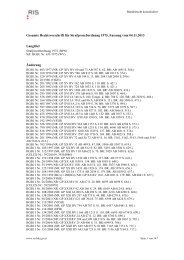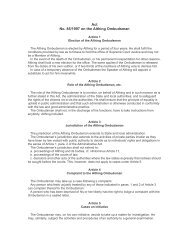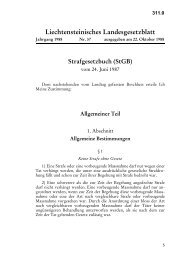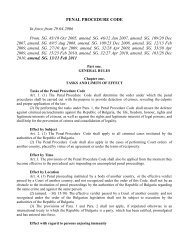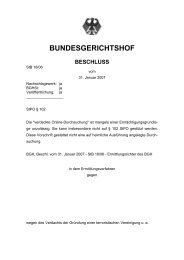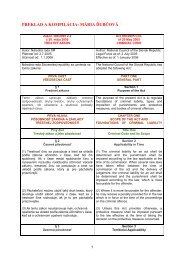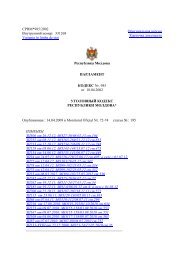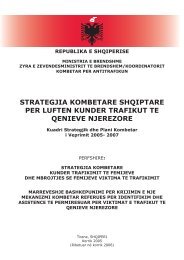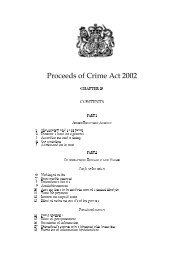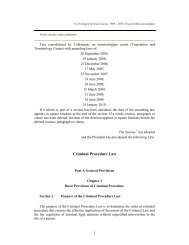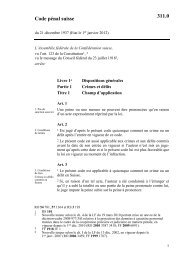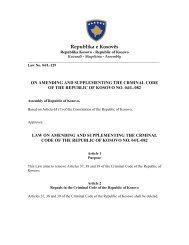Criminal Procedure Code of the Kyrgyz Republic - Legislationline
Criminal Procedure Code of the Kyrgyz Republic - Legislationline
Criminal Procedure Code of the Kyrgyz Republic - Legislationline
You also want an ePaper? Increase the reach of your titles
YUMPU automatically turns print PDFs into web optimized ePapers that Google loves.
(1) After fulfillment <strong>of</strong> requirements <strong>of</strong> Article 286 here<strong>of</strong>, <strong>the</strong> presiding judge, upon<br />
coordination with <strong>the</strong> parties establishes <strong>the</strong> procedure for examination <strong>of</strong> <strong>the</strong> evidence, <strong>the</strong><br />
court shall make a decision on that.<br />
(2) The defendant may testify at any time <strong>of</strong> <strong>the</strong> trial.<br />
Article 288. Interrogation <strong>of</strong> Defendant<br />
(1) Before <strong>the</strong> interrogation <strong>of</strong> <strong>the</strong> defendant, <strong>the</strong> presiding judge explains his/ her right to testify<br />
or refrain from testifying on <strong>the</strong> charge brought against him/ her and o<strong>the</strong>r circumstances <strong>of</strong><br />
<strong>the</strong> case, and that all his testimony may be used against him/ her. If <strong>the</strong> defendant agrees to<br />
testify, <strong>the</strong> defense counsel and participants for <strong>the</strong> defense shall interrogate him first, after<br />
that—<strong>the</strong> state prosecutor and <strong>the</strong> participants for prosecution. The presiding judge<br />
eliminates suggestive questions and questions not relevant to <strong>the</strong> case.<br />
(2) The presiding judge and associate judges shall ask questions to <strong>the</strong> defendant after<br />
interrogation by <strong>the</strong> parties, however eliciting questions may be asked at any time <strong>of</strong><br />
interrogation.<br />
(3) If <strong>the</strong> defendant pleads guilty, and wishes to testify on <strong>the</strong> brought charge in <strong>the</strong> form <strong>of</strong> a<br />
story, <strong>the</strong> court hears him without interruption, except in instances when his testimony is not<br />
relevant to <strong>the</strong> case.<br />
(4) A defendant may be interrogated in <strong>the</strong> absence <strong>of</strong> ano<strong>the</strong>r defendant by <strong>the</strong> initiative <strong>of</strong> <strong>the</strong><br />
court, or by <strong>the</strong> motion <strong>of</strong> <strong>the</strong> parties, upon a special decision (resolution) <strong>of</strong> <strong>the</strong> court. In this<br />
case, when <strong>the</strong> defendant returns to <strong>the</strong> court room, <strong>the</strong> presiding judge informs him on <strong>the</strong><br />
testimony given in his/ her absence, and allows him/ her to ask questions to <strong>the</strong> defendant<br />
interrogated in his/ her absence.<br />
(As edited by <strong>the</strong> Law KR dated 8 August 2004 #111)<br />
Article 289. Announcement <strong>of</strong> Defendant’s Testimony<br />
(1) The defendant’s testimony, given in <strong>the</strong> process <strong>of</strong> investigation may be announced, and an<br />
audio or video tape, or a film attached to <strong>the</strong> record may be reproduced by <strong>the</strong> motion <strong>of</strong> <strong>the</strong><br />
parties in <strong>the</strong> following cases:<br />
1) should <strong>the</strong>re be a substantial conflict between <strong>the</strong> testimony given by <strong>the</strong> defendants in<br />
<strong>the</strong> course <strong>of</strong> <strong>the</strong> investigation, and testimony given in <strong>the</strong> trial;<br />
2) should <strong>the</strong> defendant refuse to testify in court;<br />
3) should <strong>the</strong> case be tried in <strong>the</strong> absence <strong>of</strong> <strong>the</strong> defendant;<br />
(2) Rules provided by point (1) here<strong>of</strong> also apply to announcement <strong>of</strong> testimony given by <strong>the</strong><br />
defendant previously in court.<br />
(3) The audio and video tape, or film may not be reproduced in court without prior<br />
announcement <strong>of</strong> <strong>the</strong> testimony reflected in <strong>the</strong> respective record <strong>of</strong> <strong>the</strong> interrogation, or <strong>the</strong><br />
record <strong>of</strong> <strong>the</strong> court hearing. A note shall be made in <strong>the</strong> record <strong>of</strong> <strong>the</strong> hearing on reproduction<br />
<strong>of</strong> <strong>the</strong> audio or video tape, or <strong>the</strong> film.



